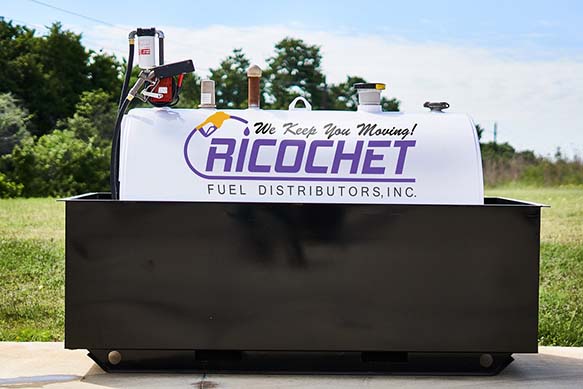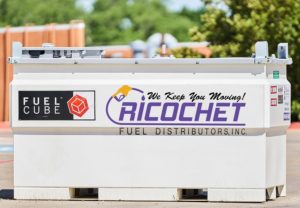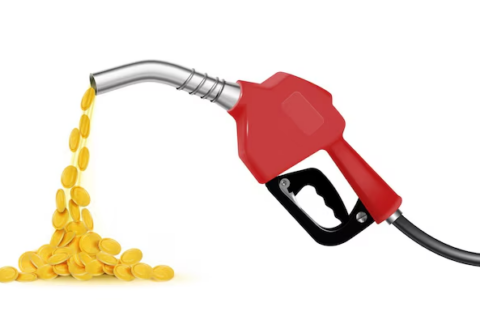5 Facts to Know About Fuel Tanks & Fuel Cubes

Having fuel tanks and fuel cubes for your business is an efficient way to save time and money on your fuel costs. And to make sure you get the most out of them, it’s essential to follow best practices. Read on to discover the dos and don’ts you need to know.
1. Fuel Storage & Tank Quality
Let’s start with the on-site tank. Whether you need a single-walled, double-walled, concrete vaulted tank, or a fuel cube, it’s crucial to start with a good quality tank that’s the size you need. On-site tanks come in 1K, 2K, and up to 10K capacity. These larger fuel tanks let your employees fuel their vehicles and equipment on-site. That helps save on labor costs and reduces paperwork. Rather than looking for a gas station and wasting time in lines, they can be working at the job. Plus, you save money since you can take advantage of bulk pricing.
Compared to traditional fuel tanks, a fuel cube is more compact. It’s the perfect solution to bring to job sites. Plus, it’s stackable and easy to move because each one has built-in forklift pockets.
2. Set-Up Time For Onsite Tanks

The set-up for an above-ground fuel tank can take about four hours. Here are the primary steps.
- INSTALL: accessories & parts
- TRANSPORT: the tank to your site
- DELIVER: offload tank & containment pan set-up
- FILL UP: the tank for use
Here are some best practices to keep in mind:
CORRECT PREPARATION: Before the delivery of your fuel tank, make sure your provider installs all accessories, pumps, and vents. Ricochet Fuel provides tanks that house fittings and equipment within the containment area. That saves time at your site during installation. A tank with the right equipment and accessories assures they are always ready for their next job.
PLANNING TRANSPORT: Have you ever tried to transport a round cylindrical tank? It’s challenging. That’s why it’s essential to purchase fuel tanks with skid frames and built-in forklift pockets. These features aren’t just nice. They speed up operations and improve staff safety when handling the containers.
PROPER PLACEMENT: For above-ground tanks, spend some time selecting the best location. Each container should sit on a firm and stable surface. That will give it the most stability and stop the tank from the possibility of tipping over or leaning. Having a flat surface is also essential. That way, if there was a leak or spill – it doesn’t run downhill. You especially don’t want it to run towards any water sources or drains in the area.
3. Maintenance For Onsite Fuel Tanks
Here are some top things to keep in mind when planning for and doing maintenance.
AVOID CONTAINMENT PANS: That will save you money. Here’s why. Whenever a secondary fuel pan fills up with water and fuel mix, it needs pumping out before transporting to a different location. That can be costly. Typically, when using a single-wall or standard double-wall tank, a secondary spill containment berm or pan is required. That’s why upgrading your containers to a unit with 110% containment will save you money. An integral secondary containment area safely houses all pump fittings, vents, and ports and removes the need for containment pans.
REGULAR CLEANING It’s essential to clean diesel tanks on a planned schedule. That keeps the tanks and fuel working at their peak. When this isn’t done, the tanks won’t last as long, and the fuel quality decreases. We recommend double-wall containers. These allow easy access to the inner tank. With full tank access, Ricochet can carry out comprehensive maintenance and lengthen the life of the tank.
Tips For Inspection & Maintenance
- Inspect the outside of the tank for rust or corrosion.
- Look to see that the fill gauge is functioning properly.
- Are there signs of spills or overfills around the fill pipe or vent lines?
- Look in the containment area. Is there accumulation of water or fuel?
- Take a look at the hose. Is there any deterioration or tears?
- Has fuel usage increased? Check for leaks.
- Clear the area around the tank of weeds or vegetation.
- Make sure any dumpster is at least 25-feet away from the tanks.
4. Proper Security Saves Fuel
LIGHTS, LIGHTS, & MORE LIGHTS: One of the least expensive ways to keep your tanks secure is to have them in a bright area with ample lighting. The best placement is to have the lights illuminate the tanks and the larger area around the tanks.
DON’T HIDE THE TANKS: Make sure they’re in a highly visible area. Not only does it keep your tanks safe, but it also protects your staff when fueling. Another tip is to place the tank as far away from the road as possible. That deters thieves because they’ll see they can’t make a fast exit.
LOCK EM UP: Locks work. Whether it’s part of the equipment cabinet or a lockbox, it makes stealing fuel just a little bit harder. If the lock isn’t built-in, make sure whatever lock you select is plenty strong. Spending a little more to secure your fuel is a good investment.
5. Utilize Stacking Cubes
Do you have a location that’s too cramped for a regular tank? Consider a fuel cube or even several. A Fuel Cube is a stationary fuel tank with double-walls. You can easily install these cubes in smaller spaces than a regular tank.
The design is for on-site equipment refueling and fuel supply backup. A cube can be connected directly to a single diesel-powered machine while dispensing fuel by an electric or manual pump. The advantage of cubes is that you can stack them which saves you space. Here are more benefits:
- It comes with a lockable equipment cabinet so equipment and ports are secured.
- Spills are contained, which increases safety.
- Built-in forklift pockets provide quick and easy maneuvering.
- Brackets make them easy to stack when empty.
- When empty, it’s easy to stack two high and save space.
- Double-walls make them weatherproof. No need for basins or pans.
Trust Ricochet for your Fuel Cube Needs
With over 30 years of experience and hundreds of truck fleets throughout the United States, we know how to ensure value and quality to our customers. Let Ricochet deliver high-quality fuel tanks and fuel cubes to your location. Ricochet Fuel can provide diesel fuel delivery directly into your vehicles, tanks, or equipment 24 hours every day, seven days a week, 365 days a year. We can work on a schedule that best fits your operation. Contact Ricochet Fuel today to see how we can help you with your portable fuel needs.

